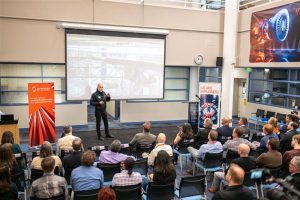
Swiss explorer Bertrand Piccard plans to take a hydrogen-powered airplane called Climate Impulse on the first nonstop, zero-emission, round-the-world flight in 2028 and thus demonstrate the potential for hydrogen and other sustainable transportation technologies. Driving those mobility innovations is a Belgian company with a 35-year presence in Alpharetta, Syensqo.
“You know probably more than me how it is built because you are the ones who provide everything that is inside: the membranes for the fuel cells, the additives, the carbon fiber, even the coating of the plane to keep it absolutely aerodynamic,” Piccard told an employee gathering at Syensqo’s Alpharetta facility on April 15. “We could not do it without you.”
Syensqo—pronounced Science Co—is one of the largest specialty chemical and materials companies in the world with about 13,000 employees and more than 60 manufacturing sites. The US is its largest market and counts 4,800 employees, 34 industrial sites and 3 major R&I centers, one of which is in Alpharetta. Syensqo was born at the end of 2023 after the split of the Solvay group into two new independent companies. Although Syensqo is a little more than a year old, with its 160 years heritage, it has a long history with the Piccards.
The scientific conferences launched by Ernest Solvay in 1911 often included Piccard’s grandfather Auguste Piccard, who found support for stratospheric explorations in a balloon-lifted pressurized capsule from Solvay’s chemical company, founded in 1863.
The company also participated in Bertrand Piccard’s Solar Impulse, which completed the first solar-powered round-the-world flight in 2016. Within months of the creation of Syensqo, the company signed on as Climate Impulse’s main technological partner.
“It is a voyage that pushes the boundaries of sustainable science to move us forward, and that’s exactly what we at Syensqo are all about: advancing humanity,” said Mike Finelli, Syensqo’s Alpharetta-based chief innovation and technology officer and chief North America officer.
The project exemplifies Syensqo in its customer focus and use of science to solve complex problems, including minimizing aircraft weight and energy waste and storing liquid hydrogen at minus-423 degrees Fahrenheit for a nine-day flight.
But the project is unusual because the company is out front.
Syensqo’s “explorers” make the plastic, carbon-fiber, biochemical, and other materials that companies use to produce parts for everything from electric vehicles and jet engines to hemodialysis machines and shampoos.
“Without chemistry, there’s a lot of things in this world that couldn’t happen,” said Donna Drake, the Alpharetta site manager and global head of analytical services.
In simplest terms, said Emmanuel David, an applications lab coordinator, Syensqo’s 530-employee Alpharetta facility sells plastic pellets with customized properties and colors tested and perfected on site. As its flagship R&I Center, Alpharetta focuses on pioneering R&I—research and innovation—for specialty polymers and composite materials.
Extruders and 3D printers produce prototypes and samples. Robots test polymers for strength, flexibility, and the effects of punctures and impacts.
Labs spread across two floors are working on hundreds of projects at a time, trying to improve the qualities of materials and make them more sustainable.
“Many times we’re ahead of the curve. Many times it’s in response to something a customer’s looking for,” Drake said.
Customers can work alongside Syensqo employees to develop and test solutions.
“Every project we work on is attached to a customer and/or a market need,” Finelli said. “Everything we’re doing is to solve a real-world problem.”
Customer care extends to community concern, Drake said, from Habitat for Humanity to science and technology promotion in schools.
“Why should we care that our materials are able to be recycled?” she said. “Because you care about the people in your building. You care about the people in your community, and you want to make it a better place.”
Syensqo is committed to carbon neutrality by 2040, and at least 80 percent of R&I involves sustainability, Finelli said. Like Climate Impulse, Syensqo is proving that science-driven efficiency can protect the environment and profits.
“For the ones who don’t care about the economy, at least it’s ecological,” Piccard said. “For the ones who don’t care about ecology, at least it’s financially attractive.”
Advertisement




